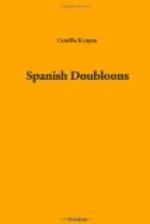In the hut itself were a rude bedstead, a small table, and a cupboard made of boxes. I was excited at first, and fancied we had come upon the dwelling of a marooned pirate. Without taking the trouble to combat this opinion, Mr. Shaw explained to Cuthbert Vane that a copra gatherer had once lived here, and that the place must have yielded such a profit that he was only surprised to find it deserted now. Behind this cool, unemphatic speech I sensed an ironic zest in the destruction of my pirate.
After their thrilling experience of being ferried from the Rufus Smith to the island, my aunt and Miss Browne had been easily persuaded to dispose themselves for naps. Aunt Jane, however, could not be at rest until Mr. Tubbs had been restored by a cordial which she extracted with much effort from the depths of her hand-bag. He partook with gravity and the rolled up eyes of gratitude, and retired grimacing to comfort himself from a private bottle of his own.
The boats of the Rufus Smith had departed from the island, and our relations with humanity were severed. The thought of our isolation awed and fascinated me as I sat meditatively upon a keg of nails watching the miracle of the tropic dawn. The men were hard at work with bales and boxes, except Mr. Tubbs, who gave advice. It must have been valuable advice, for he assured everybody that a word from his lips had invariably been enough to make Wall Street sit up and take notice. But it is a far cry from Wall Street to Leeward Island. Mr. Tubbs, ignored, sought refuge with me at last, and pointed out the beauties of Aroarer as she rose from the embrace of Neptune.
“Aroarer Borealis, to be accurate,” he explained, “but they didn’t use parties’ surnames much in classic times.”
The glad cry of breakfast put an end to Mr. Tubbs’s exposition of mythology.
So does dull reality clog the feet of dreams that it proved impossible to begin the day by digging up the treasure. Camp had to be arranged, for folk must eat and sleep even with the wealth of the Indies to be had for the turning of a sod. The cabin was reroofed and set apart as the bower of Aunt Jane and Miss Browne. I declined to make a third in this sanctuary. You could tell by looking at her that Violet was the sort of person who would inevitably sleep out loud.
“Hang me up in a tree or anywhere,” I insisted, and it ended by my having a tarpaulin shelter rigged up in a group of cocoa-palms.
Among our earliest discoveries on the island was one regrettable from the point of view of romance, though rich in practical advantages; the woods were the abode of numerous wild pigs. This is not to write a new chapter on the geographical distribution of the pig, for they were of the humdrum domestic variety, and had doubtless appertained to the copra gatherer’s establishment. But you should have seen how clean, how seemly, how self-respecting were our Leeward Island pigs to realize how profoundly the pig of Christian lands is a debased and slandered animal. These quadrupeds would have strengthened Jean Jacques’s belief in the primitive virtue of man before civilization debauched him. And I shall always paraphrase the familiar line to read: “When wild in woods the noble porker ran.”




